Shamima Begum case: I have one citizenship, says IS bride
- Published
Shamima Begum: "I got tricked and I was hoping someone would have sympathy with me"
Shamima Begum - the teenager who fled London to join Islamic State - has said she only has "one citizenship" and it was wrong for the UK to revoke it without speaking to her first.
It is only possible to strip someone of their UK nationality if they are eligible for citizenship elsewhere.
It is thought Ms Begum has Bangladeshi citizenship through her mother.
But the Bangladesh foreign ministry said the matter had nothing to do with the country.
The 19-year-old told BBC News she had hoped the UK would understand she made a "very big mistake" by joining IS.
She was a schoolgirl when she left Bethnal Green in 2015, and was found in a Syrian refugee camp last week after reportedly leaving Baghuz - IS's last stronghold.
She gave birth to a son at the weekend and now wants to return home.
While he said he would not comment on individual cases, Home Secretary Sajid Javid has suggested Ms Begum's baby could still be British.
He told the Commons "Children should not suffer. So, if a parent does lose their British citizenship, it does not affect the rights of their child."
Ms Begum's mother is believed to be a Bangladeshi national, and lawyers have told the BBC that under Bangledesh law this means Ms Begum is automatically a citizen of the country as well.
But Ms Begum told the BBC's Middle East correspondent Quentin Sommerville: "I wasn't born in Bangladesh, I've never seen Bangladesh and I don't even speak Bengali properly, so how can they claim I have Bangladeshi citizenship.
"I have one citizenship... and if you take that away from me, I don't have anything. I don't think they are allowed to do that.
"This is a life changing decision and they haven't even spoke[n] to me."
Human rights
She continued: "I was hoping Britain would understand I made a mistake, a very big mistake, because I was young and naive."
She said she changed her mind about IS after they imprisoned and tortured her Dutch husband - an armed jihadi.
Escape was impossible, she claimed: "They'd kill you if you tried."
She added that she understood the anger about her wanting to come home.
"I understand why you don't want to be sympathetic because of everything IS did... and claiming it's all for the sake of Islam... it's really not," she said.
Mr Javid said the power to deprive a person of citizenship was only used "in extreme circumstances", for example, "when someone turns their back on the fundamental values and supports terror".
"We must put the safety and security of our country first," he added.
But shadow home secretary Diane Abbott accused him of breaching the Universal Declaration of Human Rights, which states that "no-one shall be arbitrarily deprived of their nationality".
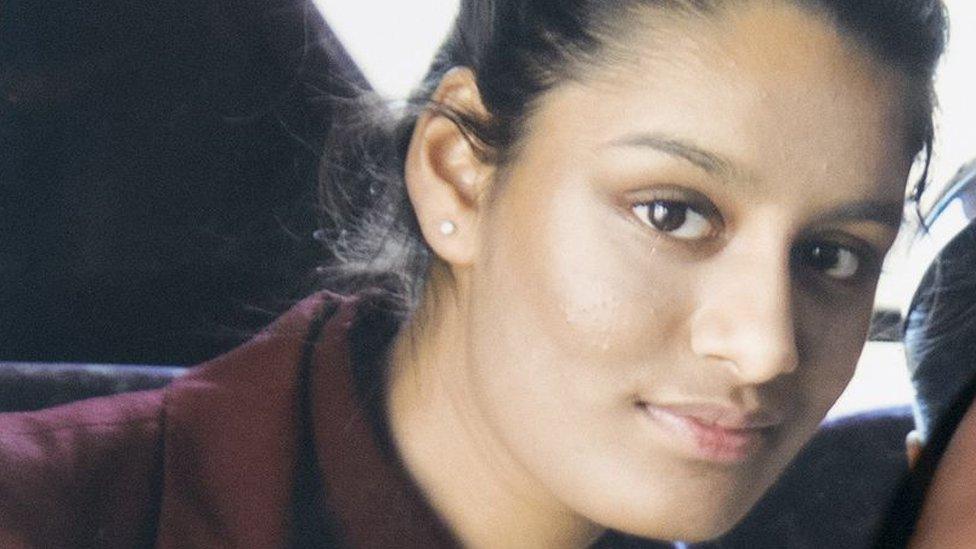
Ms Begum was 15 and living in Bethnal Green, London, when she left the UK in 2015
Earlier, Ms Begum, 19, told ITV News, external that she found the Home Office's decision "heartbreaking", but she may try for Dutch citizenship via her husband.
He is a Dutch convert to Islam and is thought to have surrendered to a group of Syrian fighters about two weeks ago.
The lawyer for Ms Begum's family, Tasnime Akunjee, said, external they were considering "all legal avenues" to contest the Home Office decision.
He told the Independent, external that the Bangladesh government "does not know who she is", adding: "Our position is that to all practical purposes she has been made stateless."

What does the law say?
Under the 1981 British Nationality Act, external, a person can be deprived of their citizenship if the home secretary is satisfied it would be "conducive to the public good" and they would not become stateless as a result.
Ms Begum has the right to challenge the Home Office's decision either by tribunal or judicial review, said former independent reviewer of terrorism legislation Lord Carlile, but would have to prove the home secretary had acted disproportionately.
He said it was a "complex issue" which "could run for a very long time through the courts", and Ms Begum could stay where she is "for maybe two years at least".
Lord Carlile said her baby may be entitled to British, Dutch and Bangladeshi nationality.

Is Shamima Begum entitled to Bangladeshi citizenship?
By Clive Coleman, BBC legal correspondent
Lawyers have told the BBC that under Bangladesh law, a UK national like Ms Begum who is born to a Bangladeshi parent is automatically a Bangladeshi citizen. That means that such a person would have dual nationality.
The Bangladeshi authorities however assert Ms Begum is not a Bangledeshi citizen.
Under this "blood line" law, Bangladeshi nationality and citizenship lapse when a person reaches the age of 21, unless they make active efforts to retain it.
So, it is Ms Begum's age, 19, that is likely - in part - to have given Home Office lawyers and the home secretary reassurance there was a legal basis for stripping her of her UK citizenship.
In 2017, the government lost an appeal case brought by two British citizens of Bangladeshi origin who were stripped of their citizenship when they were abroad.
The Special Immigration Appeals Commission ruled that E3 and N3 had not tried to retain their citizenship before they reached the age of 21, and so it had automatically lapsed.
That meant that the decision to strip them of their UK citizenship had rendered them stateless.
Ms Begum's case is different. Her Bangladeshi citizenship, if established, would remain intact until she reaches 21, even if she has never visited the country or made active efforts to retain her citizenship.

Former Conservative Home Secretary Ken Clarke said refusing Britons who joined IS the right to return would be a "great boost for jihadism" as the "hundreds of foreign jihadis stuck in camps in northern Syria" would be further radicalised.
And MP Joanna Cherry, the SNP's spokeswoman for justice and home affairs, said, external the home secretary's actions were "more about his leadership ambitions than security issues or due process".
Islamic State has lost most of the territory it once controlled, but an estimated 300 militants are believed to be left in a 0.5 sq km area near Syria's border with Iraq.
Mr Javid told MPs earlier this week that more than 100 dual nationals had already lost their UK citizenship after travelling in support of terrorist groups.
Last year, two British men, accused of being members of an IS cell dubbed "The Beatles" were stripped of their citizenship after being captured in Syria.
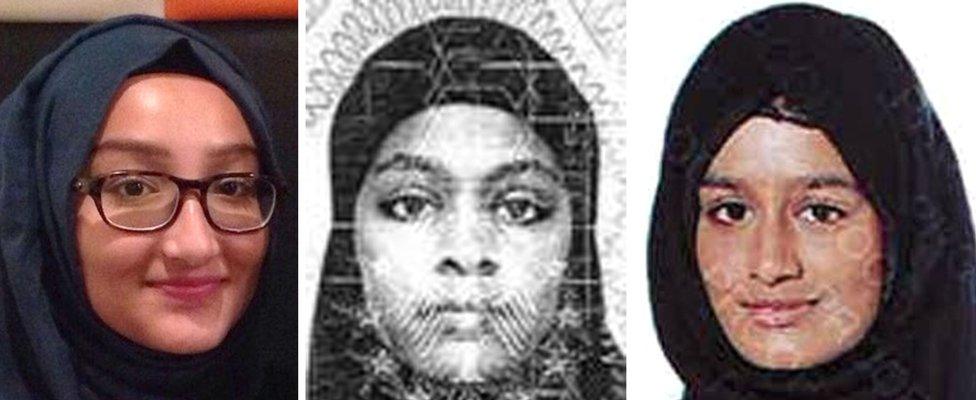
Kadiza Sultana, Amira Abase and Shamima Begum (l-r) in photos issued by police after they left the UK
In an interview with the BBC on Monday, Ms Begum said she never sought to be an IS "poster girl" and now simply wished to raise her child quietly in the UK.
She left the UK with two school friends, Kadiza Sultana and Amira Abase. Ms Sultana is thought to be dead, while the fate of Ms Abase is unknown.
- Published18 February 2019
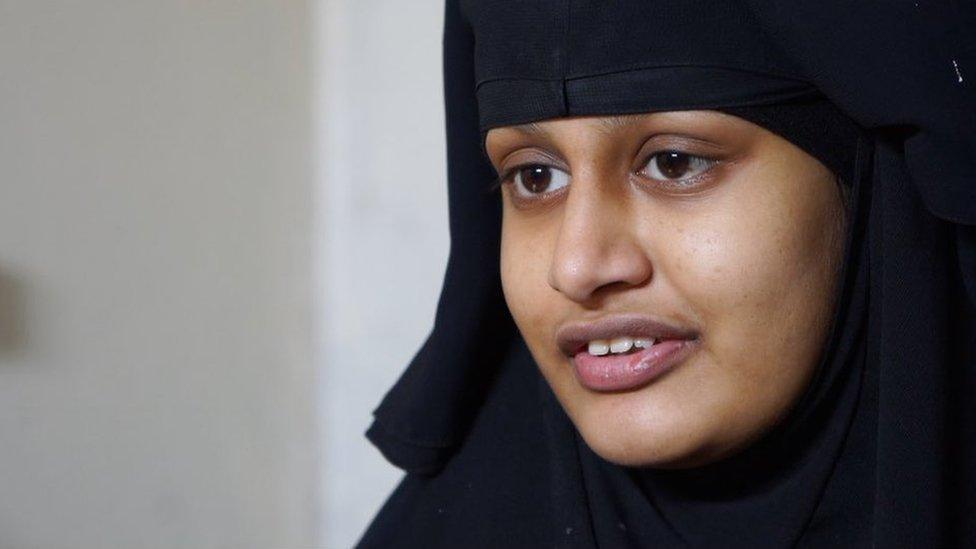
- Published17 February 2019
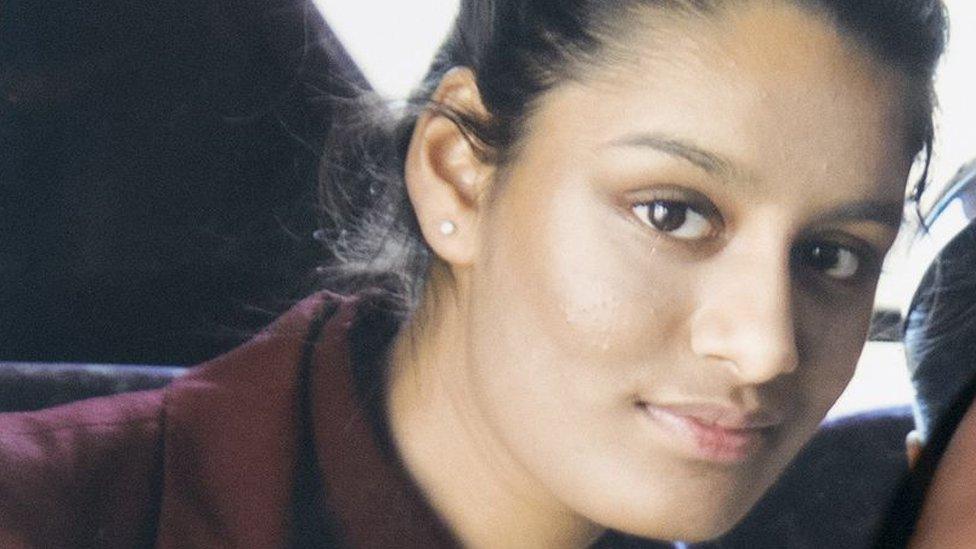
- Published15 February 2019
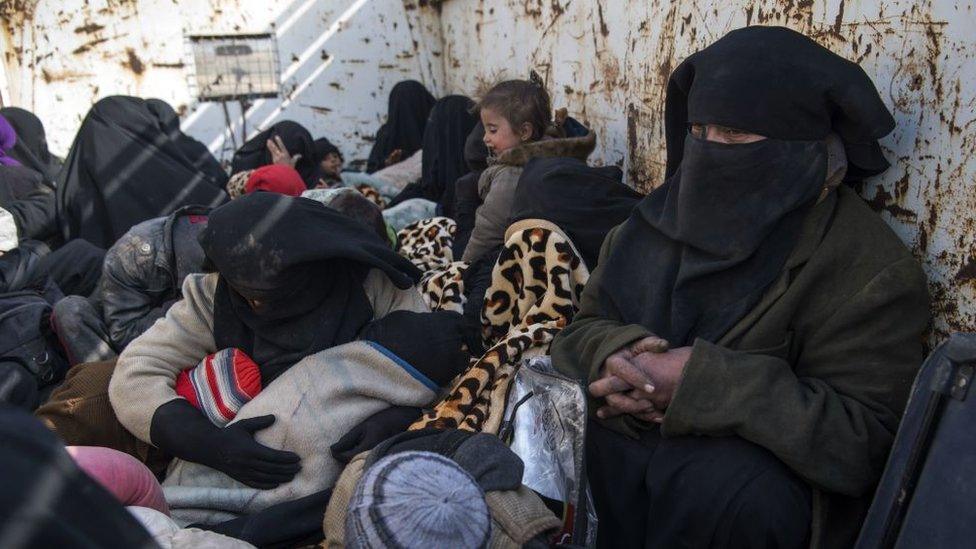
- Published14 February 2019
